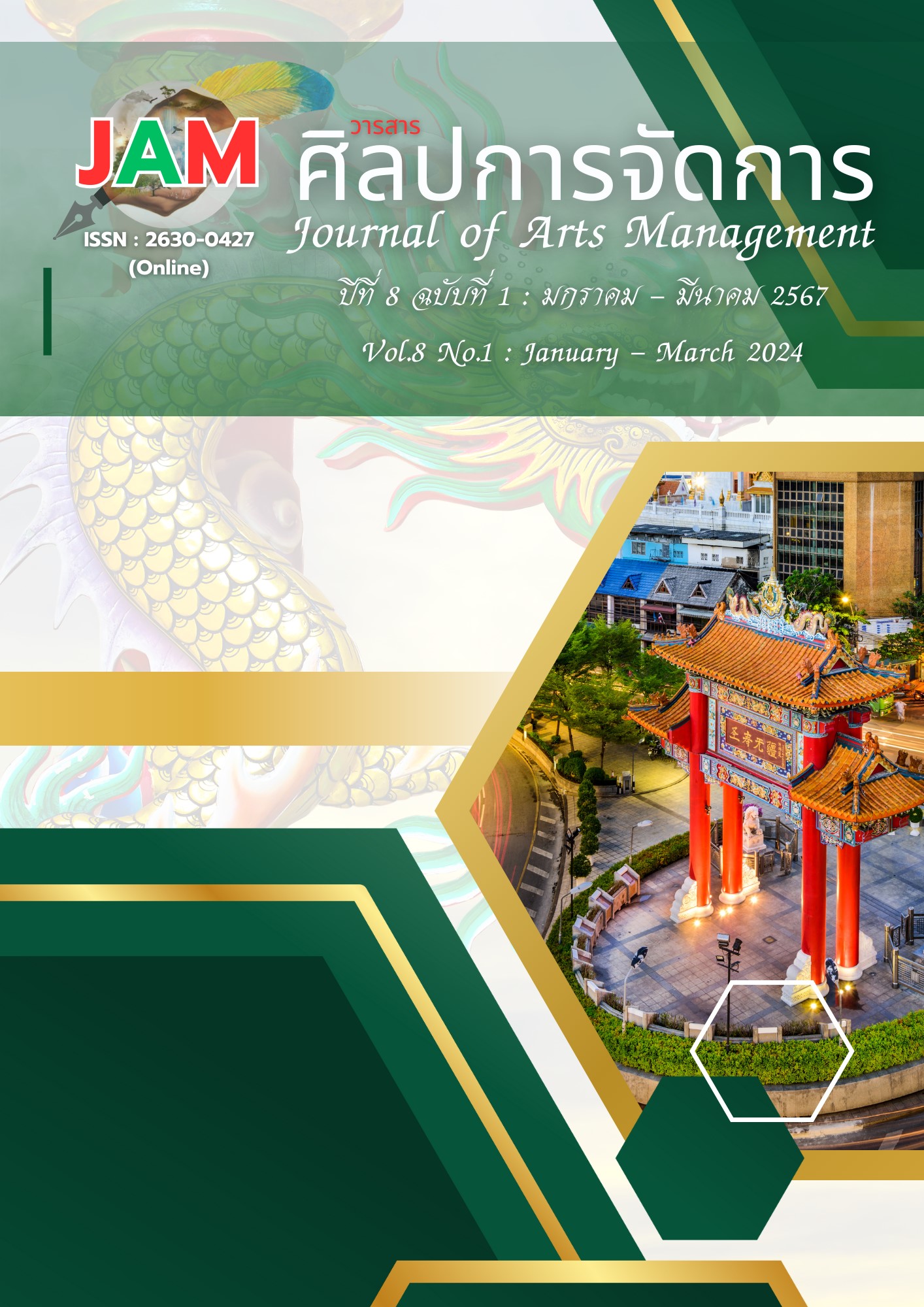Participatory Model Development in Administration Based on 21st Century Dynamics in Secondary Schools under the Secondary Education Service Area office Nonthaburi
Main Article Content
Abstract
The objectives of this research were to: 1) study the conditions of participatory model development in administration based on 21st century dynamics in secondary schools under the Secondary Educational Service Area Office Nonthaburi 2) Study the components of participatory model development in administration based on 21st century dynamics in secondary schools. The research was carried out in three steps: Step 1: study the conditions of participatory model development in administration based on 21st century dynamics in secondary schools, analyze relevant principles, concepts, and theories, and interview government teachers (30 people), inspected by experts in measurement and evaluation, and educational administration (5 people). Step 2: Develop a participatory academic administration model under the dynamics of 21st-century schools. The sample groups contained 327 government teachers. Step 3: Experiment and evaluate participatory model development in administration based on 21st century dynamics in secondary schools under the jurisdiction of the Secondary Educational Service Area Office Nonthaburi with 3 schools as follows: 1) Sai Noi School 2) Triam Udom Suksa Phatthanakan Nonthaburi School; and 3) Pak Kret School. All three schools were obtained through purposive sampling. The instrument used was a questionnaire. Quantitative data were analyzed using the mean and standard deviation; for qualitative data, content analysis was used. Statistics were used to analyze the data of the assessment using statistical packages, including exploratory factor analysis (EFA) and confirmatory factor analysis with the LISREL program. The results of the research found that in the condition of participatory model development in administration based on 21st-century dynamics in secondary schools, there are 5 main components, consisting of 1) academic participation, 2) budget management, 3) teaching and learning processes, 4) organizational dynamics, and 5) administrative dynamics of academic leaders. The results of evaluating the feasibility and usefulness were statistically significant at the.05 level.
Article Details

This work is licensed under a Creative Commons Attribution-NonCommercial-NoDerivatives 4.0 International License.
Views and opinions appearing in articles in the Journal of Arts of Management It is the responsibility of the author of the article. and does not constitute the view and responsibility of the editorial team I agree that the article is copyright of the Arts and Management Journal.
References
Boonpirom, S. (2009). Principles of Educational Administration. Book Point.
Chanklin, N. (2014). A Study of Problems and Guidelines for Quality Management in Developing Student Skills in the 21st century at Ban Noen Maprang School Phitsanulok Primary Educational Service Area Office, Area 2[Master’s thesis, Pibulsongkram Rajabhat University].
Cohen, J.M., & Uphoff, N.T. (1980). Effective Behavior in Organizations. Richard D. Irwin Inc.
Elliont, D. C. (1994). Collaborative, Decentralized Management and Perceptions of Quality Schooling Outcome. Dissertation Abstracts International, 52(10), 125.
Fry, H., Ketteridge, S., & Marshall, S. (2009). A Handbook for teaching and Learning in Higher Education (3rd ed.). Routledge.
Galupa, A., Hartulari, C., & Spataru, S. (2015). The Environment Pollution in Terms of System Theory and Multicriterial Decision. Economic Computation and Economic Cybernetics Studies and Research, 48(4). https://www.researchgate.net/publication/285612848_
The_environment_pollution_in_terms_of_system_theory_and_multicriterial_decisions
Hoy, W.K., & Miskel, C.G. (2013). Educational Administration: Theory, Research, and Practice (9th ed.). McGraw-Hill.
Jarong, M. (2017). Academic Administration of School Administrators According to the Views of Teachers in the Taling Chan Network Center under the Yala Primary Educational Service Area Office, Area 2[Master’s thesis, Yala Rajabhat University].
Khaemmanee, T. (2007). Teaching Science: Knowledge for Effective Management of the Learning Process (2nd ed.). Chulalongkorn University.
Koul, L. (1984). Methodology of Educational Research. Vani Education Book.
Krejcie, R.V., & Morgan, D.W. (1970). Determining Sample Size for Research Activities. Educational and Psychological Measurement, 30(3), 607-610.
Likert, R. (1961). New Pattern of Management. McGraw-Hill.
Phaphan, C. (2015). Basic Concepts and Theories of Leadership of Educational Institution Administrators in the 21st Century. Khon Kaen University.
Pimphan, C. (2007). Strategy for Developing Private Educational Institutions to Promote Learning Reform. Prikwarn Graphic.
Prasitratsin, S. (2011). Modern Qualitative Research Methods. Samlada.
Putti, J.M. (1987). Management: A Function Approach. McGraw-Hill.
Srimanee, P., & Photphirun, W. (2019). Factors Affecting Individual Innovative Behavior: The Case of Support Staff in Prince of Songkla University (Hat Yai Campus). Prince of Songkla University. http://kb.psu.ac.th/psukb/handle/2016/12339
Srisa-ard, B. (2017). Preliminary Research. Suviriyasan.
Swansburg, R. C. (1996). Management and Leadership for Nurse Managers. Jones and Barticn.
Tangkitwanich, S. (2013). Reforming Basic Education for Learning in the 21st Century. Thailand Development Research Institute (TDRI).
Tanprapat, C. et al. (2013). Factors Affecting to Creativity and Innovation of Private Schools In Basic Education Level, Journal of Educational Administration Burapha University, 7(2), 42-55. https://ojs.lib.buu.ac.th/index.php/edu/article/view/3029/459
Thammatasananon, S. (2011). Principles, Theories, and Innovations in Educational Administration (2nd ed.). Mahasarakham University.
Thanachotsuksabai, R. (2014). Scientific Skills of Administrators that Affect Participatory Management in Schools Under the Office of the Basic Education Commission[Doctoral dissertation, Silpakorn University].
Thaocharee, S. (2015). Internal Control of the Organization Business Efficiently. Industrial Technology Review, 21(270), 104-111.
Thongnoppakhun, W. (2013). 21st Century Skills, Future Challenges 21st Century Skills: The Challenges Ahead. http://www.education.pkur.ac.th.
United Nations. (2009). Urban and Rural Areas 2009. Population Division. https://www.un.org/en/development/desa/population/publications.
Vick, J.M., Jennifer, M.S., & Heiberger, M. (2008). The Academic Job Search Handbook (4th ed.). University of Pennsylvania Press.
Wehachart, R. (2007). Academic Administration of Basic Educational Institutions. Thaksin University Book Center.
Yongyotying, T. (2017). The Academic Administration of School Administrators under Yala Primary Educational Service Area Office 3 [Master’s thesis, Yala Rajabhat University].


